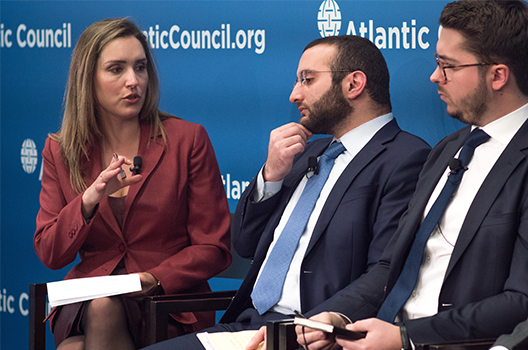 On Thursday, January 12, 2017 the Rafik Hariri Center for the Middle East hosted a panel discussion on a strategy for the next administration for combating al-Qaeda in Syria. The panel included Jennifer Cafarella, lead intelligence planner at the Institute for the Study of War; Sasha Ghosh Siminoff, president and co-founder of People Demand Change; Hassan Hassan, senior fellow at the Tahrir Insitute for Middle East Policy; Faysal Itani, senior fellow at the Atlantic Council’s Rafik Hariri Center for the Middle East; and Charles Lister, senior fellow at the Middle East Institute. The discussion was moderated by Margaret Brennan, foreign affairs and White House correspondent for CBS News, and featured introductory remarks by Nancy Okail, executive director at the Tahrir Institute for Middle East Policy. The panelists discussed the contents of a new report sponsored by the Tahrir Institute for Middle East Policy, Combating Al-Qaeda in Syria: A Strategy for the Next President, which they and other experts contributed to.
On Thursday, January 12, 2017 the Rafik Hariri Center for the Middle East hosted a panel discussion on a strategy for the next administration for combating al-Qaeda in Syria. The panel included Jennifer Cafarella, lead intelligence planner at the Institute for the Study of War; Sasha Ghosh Siminoff, president and co-founder of People Demand Change; Hassan Hassan, senior fellow at the Tahrir Insitute for Middle East Policy; Faysal Itani, senior fellow at the Atlantic Council’s Rafik Hariri Center for the Middle East; and Charles Lister, senior fellow at the Middle East Institute. The discussion was moderated by Margaret Brennan, foreign affairs and White House correspondent for CBS News, and featured introductory remarks by Nancy Okail, executive director at the Tahrir Institute for Middle East Policy. The panelists discussed the contents of a new report sponsored by the Tahrir Institute for Middle East Policy, Combating Al-Qaeda in Syria: A Strategy for the Next President, which they and other experts contributed to.
The Syrian war will enter its seventh year in 2017, and the new administration will inherit a situation in which al-Qaeda grows stronger not only on the ground, but in the spread of its ideology. Syria will be a crucial arena for the new administration to combat the growing power of the Salafi jihadist movement that is increasingly seen as the “mainstream” alternative to the Islamic State of Iraq and al-Sham (ISIS) in the Middle East. While there are factors the panelists did not agree upon, they “all agreed inaction is not an option.” Inaction, the group argued, has allowed the Syrian government to expand its control, creating a space for al-Qaeda in Syria to portray itself as a Syrian social movement and a leader in the opposition. As the world watches ISIS, al-Qaeda in Syria ingratiates itself in communities and influences a new generation of Syrians. In order to counter the group’s rise, which threatens the stability of the region and the United States’ NATO allies, the panelists encouraged engagement and support of civil society in Syria by the new administration. The panelists also argued that civilian protection, a service al-Qaeda provides to win-over civilians, should become a US priority in Syria. Besides being a humanitarian failure, neglecting the Syrian people will only feed into al-Qaeda’s rhetoric. The panelists urged the new administration to dig into the roots of the crisis in Syria, of which al-Qaeda is only a symptom, and use more than a purely military approach.
Image: CBS News’ Margaret Brennan responds to the findings in Combating Al-Qaeda in Syria: A Strategy for the Next President. Shown from left to right: Margaret Brennan, CBS News foreign affairs and White House correspondent; Faysal Itani, Atlantic Council’s Rafik Hariri Center for the Middle East senior fellow; and Charles Lister, Middle East Institute senior fellow.
